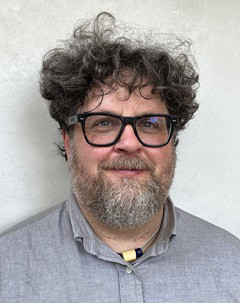Dr. Robert L.A. Hancock

Associate professor
Anthropology
- Status:
- Accepting MA/PhD students
- Contact:
- Office: FPH 143 rola@uvic.ca 250-472-4231
- Credentials:
- PhD (UVic)
- Area of expertise:
- Indigenous–state relations, Metis studies, Indigenous anthropology, history of anthropology, Indigenous education, Indigenous studies
Bio
Dr. Rob Hancock (he/him/his) is Cree-Metis on his mother’s side and English Canadian on his father’s, although he was born and raised, and is grateful to live and work, in the territory of the Lekwungen people.
He earned degrees from the University of Victoria (PhD, Interdisciplinary Studies; MA, History) and McGill University (BA Honours, Anthropology and Canadian Studies) and held postdoctoral fellowships in First Nations Studies at the University of Western Ontario and in Anthropology at UVic.
Trained as a historian of anthropology, Rob’s research and teaching interests fall in a couple of distinct but related areas: (1) the relationships between Indigenous peoples and the state, particularly in northern North America; and (2) the representations of Indigenous peoples in the social sciences, primarily but not exclusively within anthropology.
His research focuses simultaneously on the discipline’s past and on the ways that understandings of that past have been and continue to be constructed and used by current practitioners. He is interested in the contexts from which anthropological research and theory have emerged, and in the uses to which they have been put beyond the discipline (in fields such as Indigenous studies and Indigenous education). While grounded in his training in anthropology and history, his work crosses disciplinary boundaries, and he has done a considerable amount of research, publishing, and teaching in Indigenous studies and Indigenous post-secondary education.
Rob has several ongoing research projects. Along with his colleagues at the University of Alberta, Dr. Adam Gaudry (Faculty of Native Studies) and Danielle Lorenz (Faculty of Education), he is undertaking an analysis of Indigenous strategic documents at Canadian universities (supported by a SSHRC Insight Development Grant).
He is also conducting archival research exploring the influence of Indigenous anthropologists (including Robert K. Thomas, Beatrice Medicine, Alfonso Ortiz, and D’Arcy McNickle) on the emergence of Native American and Indigenous Studies as a discipline in the 1960s and 1970s (supported by fellowships from the Consortium for History of Science, Technology, and Medicine and from the University of Chicago Libraries).
As well, he is contributing to research projects examining Indigenous practices of relationally (supported by a SSHRC Partnership Grant), developing Indigenous research ethics practices for health research (supported by a CIHR Project Grant), supporting Indigenous economic well-being (supported by a UVic Aspiration Research Cluster grant), and examining the colonial history and current realities of UVic (supported by an internal Strategic Impact Fund grant). Additionally, he is serving as the UVic primary applicant for the BC Network Environment for Indigenous Health Research, a training program for Indigenous researchers (supported by CIHR).
Rob also serves as the associate director academic in the Office of Indigenous Academic and Community Engagement, where his responsibilities include co-teaching research and community engagement methods to cohorts of Indigenous students through LE,NONET and engaging in projects and initiatives that advance the university’s commitments to Indigenization and decolonization in the Indigenous Plan and the Strategic Plan.
He is excited to engage with students whose research interests overlap with his own.
Interests
- Indigenous–state relations
- Metis studies
- Indigenous anthropology and anthropologists
- history and historiography of anthropology and anthropological theory
- Indigenous education and pedagogy (post-secondary)
- Indigenous studies
Projects
Publications
In progress. Ry Moran, Carey Newman, Shelagh Rogers, Andrea Walsh, and R.L.A. Hancock, guest editors. “Special Issue: Indigenous Knowledges.” KULA: Knowledge Creation, Dissemination, and Preservation Studies (expected Winter 2021).
2015. Regna Darnell, Michelle A. Hamilton, R.L.A. Hancock, and Joshua Smith, editors. Franz Boas as Public Intellectual: Ethnography, Theory, Activism. Franz Boas Papers, volume 1. Lincoln, NE: University of Nebraska Press, xxvi+382pp
2016. Donna Feir and R.L.A. Hancock, “Answering the Call: A Guide to Reconciliation for Quantitative Social Scientists.” Canadian Public Policy 42 (3): 338-53.
2012. Adam Gaudry and R. L. A. Hancock. “Envisioning Métis Pedagogies in Post-Secondary Settings.” Canadian Journal of Native Education 35 (1): 7–22.
2011. “Eric Wolf and the Structural Power of Theory.” Histories of Anthropology Annual 7: 92–216.
2008. Jonathan Peyton and R.L.A. Hancock. “Anthropology, State Formation, and Hegemonic Representations of Indigenous Peoples in Canada, 1910-1939.” Native Studies Review 17 (1): 45–69.
2006. “Diamond Jenness’s Arctic Ethnography and the Potential for a Canadian Anthropology.” Histories of Anthropology Annual 2: 155–211.
Forthcoming. “The Power of Peoplehood: Reimagining Metis Relationships, Research, and Responsibilities.” In A People and a Nation: New Directions in Contemporary Métis Studies, edited by Jennifer Adese and Chris Andersen. Vancouver: UBC Press (expected Spring 2021).
2019. “‘Let’s do better next time’: Vine Deloria, Jr.’s Ongoing Engagement with Anthropology.” In Disruptive Voices and the Singularity of Histories, edited by Regna Darnell and Frederic W. Gleach, 353–365. Histories of Anthropology Annual, volume 13. Lincoln, NE: University of Nebraska Press.
2017. “‘We Know Who Our Relatives Are’: Métis Identities in Historical, Political, and Legal Contexts.” In Calling Our Families Home: Métis Peoples’ Experiences with Child Welfare, edited by Jeannine Carrière and Catherine Richardson, 9–30. Vernon, BC: JCharlton Publishing.
2015. “Franz Boas, Wilson Duff, and the Image of Anthropology on the North Pacific Coast.” In Franz Boas as Public Intellectual: Ethnography, Theory, Activism, edited by Regna Darnell, Michelle A. Hamilton, Robert L.A. Hancock, and Joshua Smith, 237–61. Franz Boas Papers, volume 1. Lincoln, NE: University of Nebraska Press.
2008. “Afterword: Reconceptualising Anthropology’s Historiography.” In Anthropology at the Dawn of the Cold War: The Influence of Foundations, McCarthyism, and the CIA, edited by Dustin Wax, 166–178. London: Pluto.
2006. “Toward a Historiography of Canadian Anthropology.” In Historicizing Canadian Anthropology, edited by Julia Harrison and Regna Darnell, 30–40. Vancouver: UBC Press.
